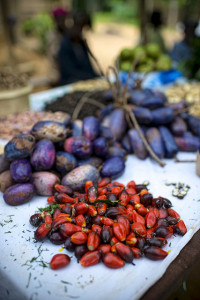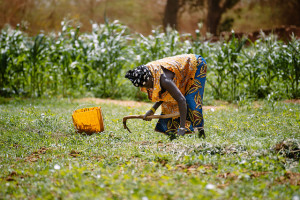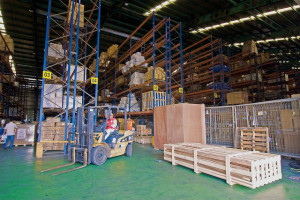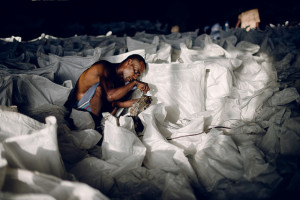
By Michael Casey, originally published at CIFOR’s Forests News
For centuries, life for smallholder farmers in Africa and Asia was relatively simple. They grew crops, kept the necessary amount to feed their families and then sold the rest at the local market.
But these days, the value chain is much more complicated.
Multinational conglomerates, development agencies, conservationists and even certification groups often play a role in what is grown, which can influence the price a farmer fetches for products like cocoa and palm oil.
Now, a new study has found that these value chain collaborations can be a force for good for smallholder farmers, who produce 80 percent of the food in Africa and Asia.
“These partnerships potentially give farmers benefits in terms of addressing poverty, food security and sustainable production,” said Mirjam Ros-Tonen of the University of Amsterdam and a former visiting scholar at the Center for International Forestry Research (CIFOR).
“There is also some evidence that these farmers are better off when they are integrated in the value chain,” said Ros-Tonen, who is the study’s lead author.
She noted that multinational companies embark on these kinds of partnerships because it is in their own interest.
“They have an interest in sustainable supplies and they have an interest in their suppliers doing well,” she said. “That’s why they invest in food production and farmers’ livelihoods.”
FARMING WATCHDOG

But such relationships have to be monitored, as farmers are often at a distinct disadvantage when it comes to working with multinational companies or government agencies.
“There is evidence that farmers lose autonomy in certain types of partnerships,” Ros-Tonen said.
Pointing to palm oil in Africa as an example, Ros-Tonen cites reports of companies coming into a region and convincing growers to combine their plots into larger ones. Although that might be good for production, this could expose communities to shortages of other food crops that they depend on to survive.
“Farmers are losing their say over what happens with their land because oil palm is going to be planted on it,” she said.
“That might jeopardize their access to food because they might have less land available for food production. It might not be sustainable at all because the production system implemented is monoculture.”

Commodity and agriculture companies can also make matters worse by failing to distribute the benefits of these value chain collaborations to all farmers, including women.
SHARE THE KNOWLEDGE
A ‘landscape approach’, which recognizes that land is used in multiple ways and considers both the environment and human systems that depend on such land, can contribute to resolving these issues.
Terry Sunderland, a co-author of the study and a principal scientist at CIFOR, said that such an approach could help people who usually don’t have a seat at the table.
“With stakeholders in landscapes, people will only engage if they feel they have some influence on the process. If they feel that the process has a trajectory already, they’ll just turn their backs. They’ve got other things to do, like feed their children,” he said.
“Having strong facilitation, whether it’s individual or institutional, is key to these kind of relationships. You can’t just have farmers talking to a company. There has to be some kind of process of facilitation.”
In the study, the authors call for all parties to work together more closely and share knowledge.

That might sound simple enough, but often this does not happen because of traditional barriers that exist between government agencies, the private sector and NGOs.
“We need new methods and new institutional arrangements to get diverse stakeholders together and have joint knowledge exchanges,” Ros-Tonen said.
Ros-Tonen and her co-authors dismissed concerns that farmers opt out of value chain collaborations because market integration “unfolds through a number of crises across different scales, which include the steady erosion of local farming knowledge, a narrowing of choices for producers and consumers, and an increased incapacity of food systems to feed the world in a sustainable and healthy manner.”
While they said those concerns weren’t completely unfounded, they said it should be up to farmers how they proceed – many of whom told the researchers that they want to be part of the global economy.
“There is an ideological stand in rejecting value chain integration, and proponents of food sovereignty and those who reject value chain integration claim to speak on behalf of the farmers,” Ros-Tonen said.
“But when we speak to cocoa farmers in Ghana, they say: ‘We want to be part of this market. It improves our lives. We have bigger income because cocoa has a fixed price.’”
Striking the right balance is essential, and at the 2016 Global Landscapes Forum: The Investment Case, discussions between the finance, corporate, government and NGO sectors took place with the objective to improve investments in sustainable landscapes.
Such work can help bridge the gap between private finance and sustainable landscapes, working toward enhancing the livelihoods of smallholders and the environment, and is an example of the facilitation and knowledge exchange that the study’s authors call for.











